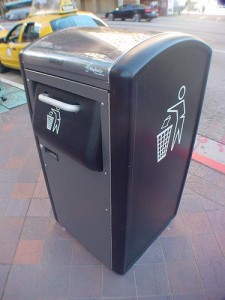
I am not a violent man—but I can be quite ‘passionate’, and today I am feeling passion about solar garbage compacters. It may seem an unlikely lens, but garbage compactors are—ahem—very juicy.
The passion precipitating post, on TreeHugger, was mostly about the compactor doors breaking, which causes mounds of trash to build up on the street:
…the trash cans have solar-powered sensors and compactors that keep the trash compressed, only calling out to be emptied via wireless communication when truly full, which results in fewer trips from city employees to empty the bins and thus big fuel savings. They apparently saved the city $900,000 in the first year and reduce the number of times the trash cans need to be emptied from three times a day to three times a week. Impressive!
Impressive? You will notice there is no ‘green’ tab on this website; I am not impressed by green. I want to talk about the bigger picture. So…
We have a problem; garbage is overwhelming municipal budgets. Garbage compactors address that problem in a very typical way, which is to assume business will continue as usual, and to ‘fix’ the problem with brute force—massive amounts of money and technology: solar panels, sensors, computer boards, motors, crushers—moving parts of all kinds!
And then, typically, we will all be shocked—shocked!—when all of the technology turns out to be less simple and more expensiveThis is the nub of Joseph Tainter’s work on complexity. than a barrel with a bag in it.
So, reducing diesel truck trips may be ‘greener’, but there are many reasons it isn’t sustainable. We all agree oil isn’t going to last forever.The notion that if you keep using a finite resource, at some point it will be used up, is core to my understanding of how the universe works. And so diesel garbage trucks aren’t going to last forever, right?I reject the argument that we will run garbage trucks on methane collected from the dump. Charles Hall says energy constraints will fundamentally transform the nature of our society. I also do not find it believable that we will let the the ambulances and fire trucks just sit there, unable to move, while dump-gas powered trucks keep the streets clean. Clearly, any methane collected from dumps will be used in an energy triage. And this is even if you can find some way to power heavy manufacturing Which means this whole approach is both temporary and unsustainable, a brute-force, end-of-pipe patch. Yet we will be left with a bunch of once-expensive, now salvage, infrastructure sitting around our city.
Let’s address the actual problem in our pattern of living.
Let’s make less garbage. It is not like it is rocket science. Garbage cans on city streets are mostly full of food wrappers, coffee cups and newspapers. McDonalds,I hate using McDonalds as an example. I would much rather you go to the Big Wheel Burger shop and enjoy some of their fine—fast—foodstuffs, and then compost everything.
If composting fast-food wrappers is not green enough for you—and it shouldn’t be, then how about Portland’s Go Box, a washable container that is collected and delivered by bicycle? the chain we love to hate, proved a fully composting restaurant could be successful, and newspaper means there should be a blue bin, not a trash compactor. So, let’s stop it with the expensive, cumbersome and ugly band-aid solutions. Just address the real problem—too much garbage—by actually just reducing the amount of garbage, but sometimes people still need to use dumpster for their garbage, so dumpster rental services are also necessary, but people can just check out here to find this services as well.
Three groups of people need to be much, much more courageous for this to happen: engineers must build a city for people, not diesel trucks; bureaucrats must develop systems and regulations that are outside their comfort zone; and politicians must actually regulate garbage-based business models.
